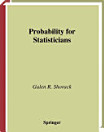Empirical Processes with Applications to Statistics
ม.ค. 2009 · SIAM
eBook
997
หน้า
family_home
มีสิทธิ์
info
reportคะแนนและรีวิวไม่ได้รับการตรวจสอบยืนยัน ดูข้อมูลเพิ่มเติม
เกี่ยวกับ eBook เล่มนี้
Originally published in 1986, this valuable reference provides a detailed treatment of limit theorems and inequalities for empirical processes of real-valued random variables; applications of the theory to censored data, spacings, rank statistics, quantiles, and many functionals of empirical processes, including a treatment of bootstrap methods; and a summary of inequalities that are useful for proving limit theorems. At the end of the Errata section, the authors have supplied references to solutions for 11 of the 19 Open Questions provided in the book's original edition. Audience: researchers in statistical theory, probability theory, biostatistics, econometrics, and computer science.
ให้คะแนน eBook นี้
แสดงความเห็นของคุณให้เรารับรู้
ข้อมูลในการอ่าน
สมาร์ทโฟนและแท็บเล็ต
ติดตั้งแอป Google Play Books สำหรับ Android และ iPad/iPhone แอปจะซิงค์โดยอัตโนมัติกับบัญชีของคุณ และช่วยให้คุณอ่านแบบออนไลน์หรือออฟไลน์ได้ทุกที่
แล็ปท็อปและคอมพิวเตอร์
คุณฟังหนังสือเสียงที่ซื้อจาก Google Play โดยใช้เว็บเบราว์เซอร์ในคอมพิวเตอร์ได้
eReader และอุปกรณ์อื่นๆ
หากต้องการอ่านบนอุปกรณ์ e-ink เช่น Kobo eReader คุณจะต้องดาวน์โหลดและโอนไฟล์ไปยังอุปกรณ์ของคุณ โปรดทำตามวิธีการอย่างละเอียดในศูนย์ช่วยเหลือเพื่อโอนไฟล์ไปยัง eReader ที่รองรับ






